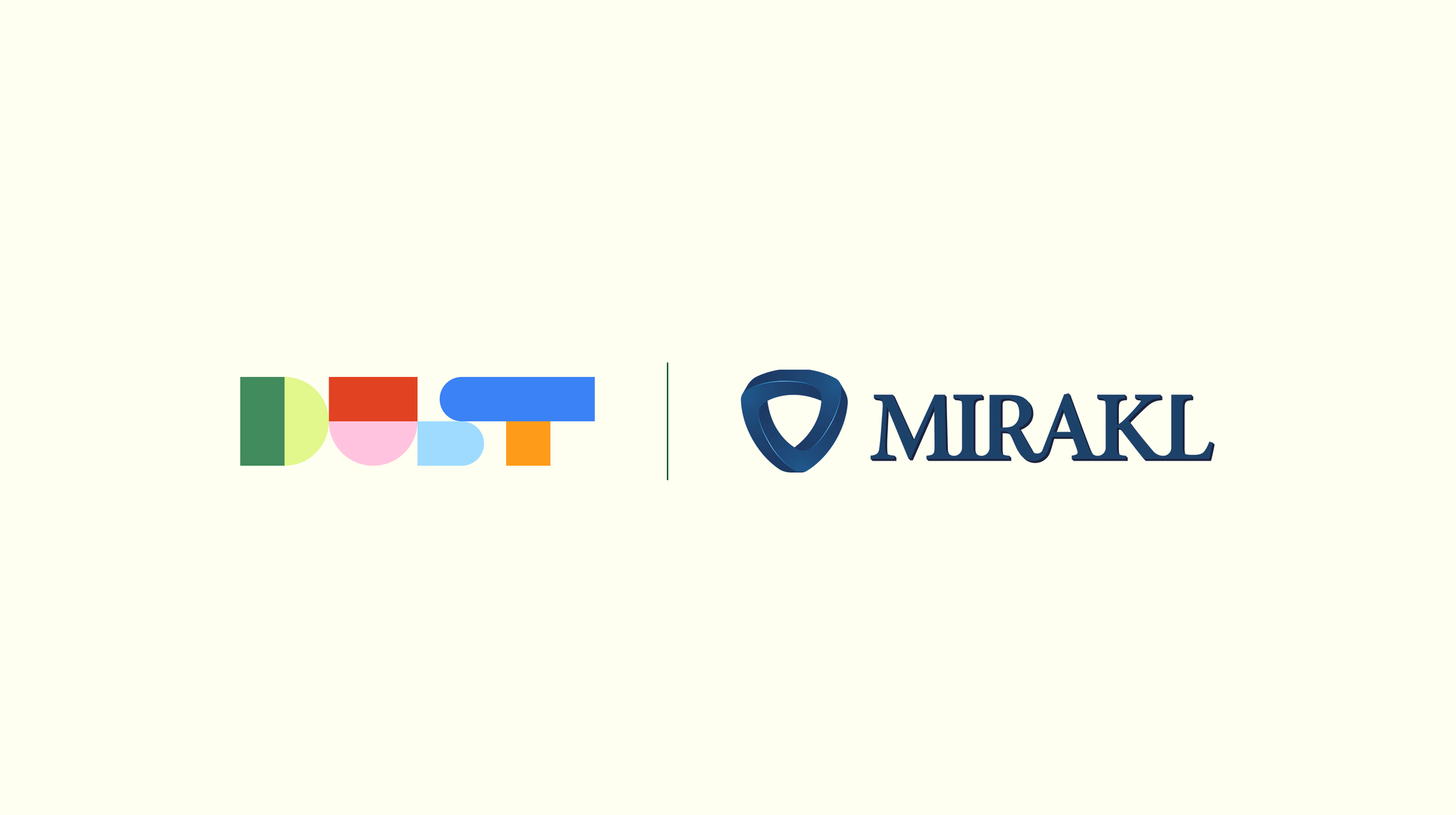Why Mirakl chose Dust as its go-to agentic solution

Mirakl was founded in 2012 by serial entrepreneurs Adrien Nussenbaum and Philippe Corrot to help companies build and scale third-party marketplaces—effectively creating the “marketplace software" category in Europe and beyond.
Innovation is core to Mirakl's DNA, so when AI emerged as a transformative force, the company didn't just adopt the technology—they embraced it. As Mirakl has evolved into a multi-product company serving both marketplace operators and sellers across B2C, B2B, and retail media, their approach to AI has grown increasingly sophisticated.
We sat down with Anne-Claire Baschet, Chief Data and AI Officer at Mirakl, to understand how her team moved beyond basic AI adoption to choosing Dust as their primary AI platform to provide truly agentic capabilities.
The opportunity: Closing the gap to 100% AI adoption
From the beginning, Mirakl encouraged all of their employees to use generative AI—not just as a one-off experiment, but as a way to discover meaningful ways to do their jobs better and faster.
Creating this culture of AI adoption, explains Anne-Claire, began with the mindset of leadership. “We never saw AI tools as a cost, but as an investment. It’s our responsibility as a company to invest in the skills of our employees and to enable them.”
That's why they made the decision to invest in ChatGPT Enterprise in early 2023. With 55% of employees actively using the platform, Mirakl had achieved strong adoption.
But by mid-2024, ambitious teams were hitting technical barriers. The inability to leverage Mirakl-specific knowledge from their Confluence documentation, Zendesk customer data, and Slack conversations, was limiting what they could build.
After a year of experimentation, they identified several gaps and realized they needed a platform that was purpose built for agentic use cases to achieve maximum adoption and ROI. To address this, Mirakl identified three key levers:
1. A platform without limits
The challenges became clear when Anne-Claire's team tried to implement AI agents that could actually support their daily workflows.
"For example, our team wanted to create briefs before meeting with customers. To do this, they needed to pull knowledge from Salesforce and Google Drive," Anne-Claire explains. But their current tool couldn't access this data, forcing teams to manually copy and paste information—defeating the purpose of automation.
It was evident that they needed a platform that could pull from company-specific context by accessing their entire knowledge base and connecting to all their business systems. Similarly, their new solution had to support not just knowledge retrieval, but also the ability to take actions across tools and handle complex multi-step processes.
Finally, rather than being locked into a subset of AI models that might become outdated, they required a model-agnostic platform that could adapt to new innovations.
2. Driving AI literacy through building
Anne-Claire's vision was clear: transform the 75% of employees who were users into builders. The goal wasn't just adoption—it was literacy. With their previous solution, Mirakl only had five builders.
They needed a platform that would make agent creation accessible through no-code interfaces, transforming their workforce's understanding of AI capabilities. When people build agents themselves, they learn what's possible beyond basic search. This hands-on experience would drive the deeper AI transformation that companies need to remain competitive. “We wanted anyone to be able to create an agent and interact with the tool.”
3. Enterprise-grade infrastructure built for AI workflows
For a company handling sensitive transactional and customer data, enterprise-grade security was non-negotiable. "We wanted a solution that would fit our security requirements from the start," Anne-Claire notes. Key requirements included regional hosting to ensure data sovereignty and zero data retention guarantees from model providers to maintain strict compliance with corporate data governance policies.
More importantly, Mirakl required a solution built for enterprise agents that could handle complex permissions and execute multi-step workflows.
The process: Evaluating AI solutions for security, usability, and long-term fit
Given the challenges that were limiting full adoption, Anne-Claire decided it was time to look for a new solution. At this point, many organizations face a familiar question: should we build or buy?
Anne-Claire had strong conviction about this. “We have talented people on our product, design, engineering, and data science teams. And we want them to bring 100% of their value to our customers.” In other words, she didn’t want to spend valuable resources internally rebuilding AI infrastructure that already existed—especially if it meant diverting resources away from serving their customers.
The decision: Identifying Dust as the clear fit for Mirakl’s AI vision
When evaluating alternatives, Mirakl discovered that many platforms were fundamentally limited by their origins. Tools pivoting from enterprise search lacked true agentic capabilities. Consumer chat tools retrofitted for enterprise missed critical infrastructure needs. Platforms focused on vertical use cases couldn't support the cross-functional workflows that create real value.
When Anne-Claire discovered Dust, she found a platform that matched Mirakl's ambitions:
✅ Purpose built for agentic workflows as the core product
"It's s a horizontal enterprise platform where the intended users are the workers of the company. We weren't looking for just a search tool—we wanted a tool that would allow anyone to build agents and fundamentally rethink their workflows."
Dust was built with agents at its core. This isn't a side feature or a roadmap item—it's the foundation of the product.
Today, Mirakl uses Dust agents for tasks that require deep context and cross-functional data access:
- Preparing for sales calls with synthesized information from Gong and Salesforce
- Generating RFP responses that pull from product documentation, past proposals, and customer data
- Automating CRM updates after calls with context from multiple sources
- Creating multilingual product documentation and microcopy
- Improving customer service response times without sacrificing accuracy
Dust's agent-specific permissions prevented broadly-shared files from being exposed through AI search, while ensuring agents could access necessary knowledge even when triggered outside of individual user contexts.
✅ Empowering every employee to become a builder
With Dust's no-code interface, 30% of Mirakl employees have already built active agents—a dramatic shift from passive AI consumption to active creation.
"Anyone can create their own agent and interact with the tool,"
- Anne-Claire Baschet, Chief Data & AI Officer, Mirakl
This accessibility drives the AI literacy transformation Mirakl sought. When employees build agents themselves, they discover capabilities beyond chat. They learn to decompose workflows, identify automation opportunities, and understand how AI can augment their specific role.
✅ A partner committed to the agentic future
"We loved the fact that Gabriel and Stan, the co-founders of Dust, are also serial entrepreneurs and have strong conviction on the product," Anne-Claire explains.
Dust's pricing model reflects this shared vision—focusing on active usage rather than seat licenses.
"What really matters are the success metrics—whether people are actively using the platform and building their own agents. That mindset was really aligned with ours because it's built around the idea that we want to create value together."
- Anne-Claire Baschet, Chief Data & AI Officer, Mirakl
With Dust's commitment that agentic capabilities are core to their revenue and focus, Mirakl knows they can expect continuous improvements in the areas that matter most for their AI transformation.
Early results: Hitting 91% utilization within one month—and still climbing
When Mirakl adopted Dust, they were already at around 80% utilization with their previous AI tools. Typically, a major platform migration results in a temporary dip in usage.
But with Dust, the opposite happened. “During the migration, which happened within a month, we didn’t decrease our usage—we increased it, from 80% to 91%.” That puts the company within striking distance of its 100% utilization goal. Mirakl now has 80% weekly active users on Dust, 70% of which are leveraging custom agents (designed for specific business tasks).
Even more significant: 30% of Mirakl employees have already built active agents that are regularly used by themselves or their teams, and the goal is to increase builders to 50%. This marks a fundamental shift from AI consumption to AI creation—the difference between using AI and leveraging its potential.

